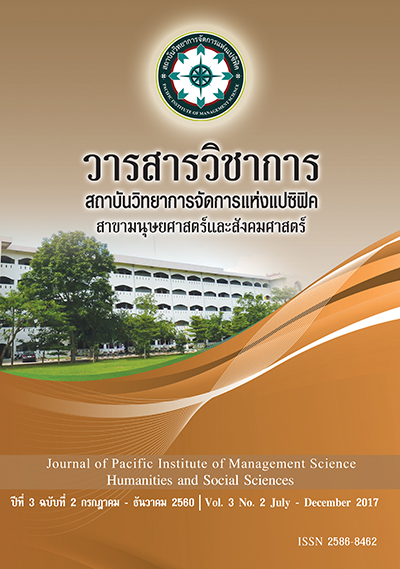Development Models of SMEs Based on the Thai Government Enterprise Promotion Policy Using Barter Business System
Keywords:
Barter Card Barter Business System, Small and Medium EnterpriseAbstract
The objectives of the study were threefold; (1), to study the potential problems and their solutions when the business operation through the barter card of the SMEs comes into being; (2), to investigate the development of SMEs in accordance with the public enterprise promotion policy via barter business system; and (3), to offer development patterns and business management based on the barter business model deemed appropriate to SMEs in the case of Thailand. The study was mixed in nature--the quantitative and qualitative research methods. With respect to the quantitative research method, the research randomly selected 353 SMEs’ members as the sample for the study; out of the population of the study was 3,100 SMEs’ members and the sample size was determined by resorting to Yamane’s formula. The collected data were then analyzed by dint of descriptive statistics, Pearson’s product- moment correlation, and multiple regression analysis (the Enter method). Regarding the qualitative research method, the needed data were obtained from documents, non-participant observation, audio-visual materials, and in-depth interviews with 20 key informants. All the informants had long experience with the SMEs’ management. The data from all sources were analyzed using content analysis, narrative analysis and analytic induction. It was found from data analysis as follow
1) The problems and dificulties encountered by SMEs’ managers were found to be at a high level.
2) The laws and the government policy concerning the barter card - based SMEs management were found to be highly suitable.
3) The factors inluencing the development pattern of SMEs in accordance with the Thai government enterprise promotion policy using the Free- Fair-Friends Exchange were knowledge of barter card, problems and solutions of the barter card-based management, laws and government policy, policy and plan of SMEs, and the Free-Fair -Friends exchange System. The R2 value is .69, indicating that 69 percent of the variation in the development pattern of the SMEs according to the public enterprise promotion policy using the Free-Fair-Friends Exchange System is explained by the ive independent, or predictor variables (knowledge of barter card, problems and solutions of the barter card-based management, laws and government policy, and policy and plan of SMEs, and the Free-Fair -Friends exchange System).
4) The SMEs entrepreneurs were not required to pay fees and dues from the start to inish, the SMEs operation was characterized as transparent and fair, and the operation was carried out under the acceptable conditions of trading partners, the mutual interest, and the continued merit assessment. In a nutshell, the SMEs work was operated in a friendly and exploitation-free fashion.
5) The indings of the study enable the researcher to be in a position to make the following recommendations; as will be seen as follows: Volunteer mediators should be made available so as to help coordinate and facilitate the exchange of goods . The SME entrepreneurs should gain insights into their own businesses as well as their products, and they must be enthusiastic about seeking marketing experts to share views and ideas about the SMEs operation.
The work performance and achievements of the SME entrepreneurs should be evaluated on a regular basis so that the agencies concerned can learn of problems and provide problem resolutions (if any). The SMEs entrepreneurs must take pains to operate their businesses with integrity and refrain from taking advantages of other SME entrepreneurs. and group formulation among SME entrepreneurs is a must, by doing so, they would be in a better position to exchange goods at lower prices than those of the market.
References
บาร์เทอร์คารด์ , 2559 . เออนไลน์ เข้าถึงได้จาก https://www.bartercard.co.th/Thai.html, สืบค้นเมื่อวันที่ 10 มิถุนายน 2559.
บาร์เทอร์คาร์ดได้เร็คเทอรี่. ประเทศไทย. ฉบับที่ 42 , เดือนมกราคม 2559
ธงพล พรหมสาขา ณ สกลนคร (2553). การพัฒนาองค์กรของผู้ประกอบการวิสาหกิจขนาดกลางและขนาดย่อม ในเขตภาคตะวันออกเฉียงเหนือของประเทศไทย. รายงานการวิจัยภาควิชาสารัตถศึกษา คณะศิลปะศาสตร์ . มหาวิทยาลัยสงขลานครินทร์ .
รุ่งนภา ต่ออดุม. (2550). ปัจจัยความสาเรจ็ของผู้ประกอบการในธุรกิจขนาดกลางและขนาดย่อม (SMEs) ในอุตสาหกรรม เกษตร ภาคการค้าในจังหวัดฉะเชิงเทรา.การศึกษาค้นคว้าอิสระบริหารธุรกิจมหาบณัฑติ มหาวิทยาลัยราชมงคล เทคโนโลยีธัญบุรี.
สถาบันพัฒนาวิสาหกิจขนาดกลางและขนาดย่อม. (2559). เครือข่ายมหาวิทยาลัยสงขลานครินทร์ “ ศักยภาพในการปรับ ตัวของผู้ประกอบการณ์ธุรกิจ SMEs เพื่อรองรับการเปิดเสรีทางการค้ากรณีศึกษาจังหวัดสงขลา. [ออนไลน์ ] เข้าถึงได้ www.sme.go.th.สืบค้นเมื่อวันที่ 10 สิงหาคม 2559.
Yamane, Taro. (1973). Statistics : an introductory analysis. New York : Harper and Row.
Downloads
Published
Issue
Section
License
บทความที่ได้รับการตีพิมพ์เป็นลิขสิทธิ์ของ สถาบันวิทยาการจัดการแห่งแปซิฟิค
ข้อความที่ปรากฏในบทความแต่ละเรื่องในวารสารวิชาการเล่มนี้เป็นความคิดเห็นส่วนตัวของผู้เขียนแต่ละท่านไม่เกี่ยวข้องกับสถาบันวิทยาการจัดการแห่งแปซิฟิค และคณาจารย์ท่านอื่นๆในสถาบันฯ แต่อย่างใด ความรับผิดชอบองค์ประกอบทั้งหมดของบทความแต่ละเรื่องเป็นของผู้เขียนแต่ละท่าน หากมีความผิดพลาดใดๆ ผู้เขียนแต่ละท่านจะรับผิดชอบบทความของตนเองแต่ผู้เดียว







